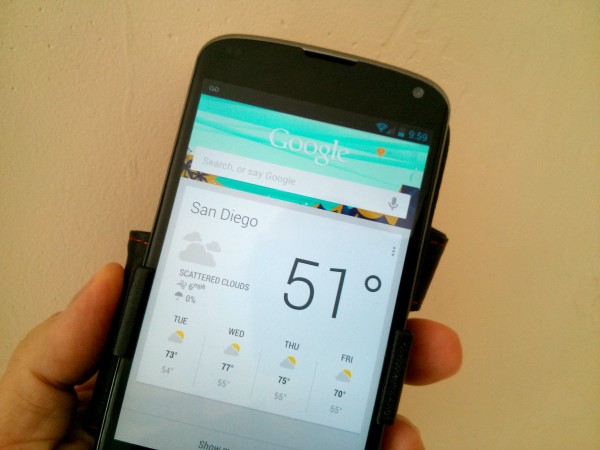Google Now for Chrome changes EVERYTHING

François Beaufort, the developer who recently made headlines by outing Chromebook Pixel, is stirring up things again. He uncovered code that all but assures Google Now will soon come to Chrome and Chrome OS. I can't overstate how enormously game-changing the service will be. Google Now is the purest evolution of sync and the killer app for the contextual cloud computing era.
We are on the cusp of Star Trek computing, where information is available at the command of your voice and the machine is a personal assistant that anticipates you. Google Now delivers a hint of this future on Android devices. Bringing it to PCs puts the search and information giant ahead of everyone because, with the exception of a possible future Microsoft-Facebook partnership, no other company has the resources to provide so much personalized information to so many people in so many places in so many ways.
Context is King
If you're looking for a reason why Apple stock falls, while Google's rises, context is the reason -- not innovation. The "i" word is overused anyway. Apple operates under the misconception that we have entered the post-pc-era. There is no such thing. I contend (again) that this is the contextual cloud computing era where how, when and where devices and services are used matters more. How people use iDevices change depending on context, but the underlying cloud services deliver it. Google gets context. Few other companies do.
The cloud is all about context. Content follows users everywhere, independent of device. Your music is available anytime, anywhere on anything. You watch a movie in one context, sitting in man chair at the mall on a smartphone and resume on the big-screen TV at home. Content is the same, but context and device change. They say content is king. No, context is.
The surest way to platform success, particularly around ones where third parties build other stuff and profit from it, is the killer application. More than one is even better. But I use application differently than most people do. I don't refer to the software program, but how the thing is used. The context. The PC offered greater contextual usage than the mainframe. Suddenly a computer could be used inside a small business, home or school rather than fixed terminals connected to a mainframe. Smartphones and tablets provide even greater context, as do panels delivering ads on the street or recipes to your refrigerator. There are more applications -- meaning ways the thing is used.
But in this computing era, devices don't stand alone. They are connected. In June 2007, I started calling out sync as the "killer application" for the connected-device era, warning: "If Google gets synchronization right before Microsoft, it's game over". No company does sync better than Google. But the term isn't just about synchronizing information but getting your life in sync -- that's the practical benefit the search and information delivers, particularly with Google Now.
Here and Now
One dozen products -- Android; Apps; Chrome; Gmail; Google+; Maps; Search; Search, plus your World; Shopping; Talk; and YouTube -- form the current contextual platform that culminates in one service. Google Now, alongside Notifications and voice search, sits atop it all, proactively providing information relevant to you. The service taps into search, location and behavior -- what you do when and where -- providing presence and assistance. That's scary to some people, but the information also saves time, like being warned about a traffic accident before starting your commute home or your flight is cancelled before heading out to the airport.
Location services are critical to context as Google gives it. As a platform, everything changes the day some service seriously starts sending proactive advertising based on location. If you search for pizza on smartphone or tablet, there should be discount coupons with the results -- scan and redeem on site. Or, using a service like Google Now, consumers should see coupons or discounts as notifications -- if they opt-in to accept them. That's how the search and information giant could eventually profit from the service and make it appealing to third parties.
Google Now isn't just about context, but context that directly matters to you in the moment. Hence "Now" in the name. Using the overused "i" word again, "life-changing" is often the term most people apply to real innovations. The World Wide Web, digital video recorder, Wikipedia, search and smartphone are all examples of products or services that viscerally changed behavior. Quickly. In less than a generation. My 18 year-old daughter can't remember a time when she couldn't pause live TV or easily record shows. Mosaic was just a research project and Netscape a beta browser the year she was born.
Google Now certainly changes my life. But the application, the context, is confined to Android. The service doesn't go everywhere I need it. By bringing Google Now and Notifications to Chrome, the process of keeping life in sync raises to a whole other level -- and will give people who use the service on the PC all the more reason to want it on smartphone or tablet. That's good for Android, even if Google chooses to support iOS.
Last week, Facebook introduced a new News Feed that is uniform across devices. That's the right approach. But Google does better by providing a contextual service which user experience promises to be uniform, also across devices, but more relevant. "Good Morning, Dave. Today is your assistant's birthday. There's a traffic jam on the I-5. 'Skyfall' is available to purchase from Google Play. Amazon Prime shipped your Gillette electric razor. Movie '2001: A Space Odyssey' recorded over night".
Photo Credit: Joe Wilcox
